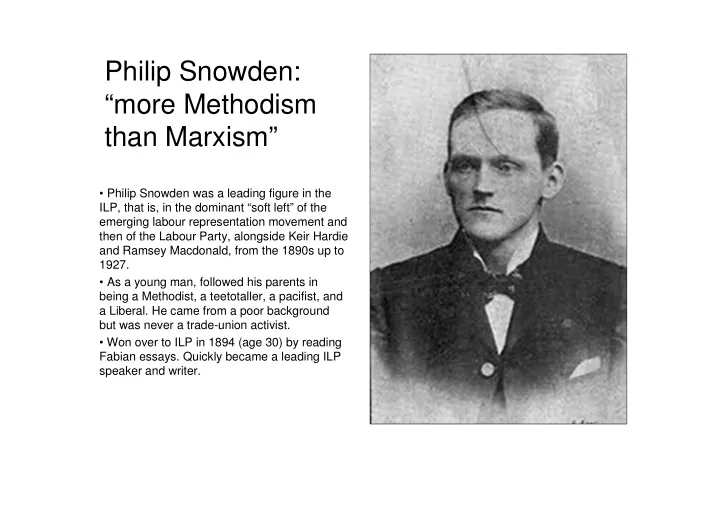

Philip Snowden: “more Methodism than Marxism” • Philip Snowden was a leading figure in the ILP, that is, in the dominant “soft left” of the emerging labour representation movement and then of the Labour Party, alongside Keir Hardie and Ramsey Macdonald, from the 1890s up to 1927. • As a young man, followed his parents in being a Methodist, a teetotaller, a pacifist, and a Liberal. He came from a poor background but was never a trade-union activist. • Won over to ILP in 1894 (age 30) by reading Fabian essays. Quickly became a leading ILP speaker and writer.
Strikes... and the Fabians • The Fabian Society was formed in 1884 by a group of intellectuals. Took the name "Fabian" from a Roman general said to have triumphed through delaying tactics rather than militant assault. Looked to "permeation" of the Liberal Party, but joined Labour when it was launched. • Its gradualist approach, and its emphasis on economic efficiency rather than class struggle, had wide influence on people like Snowden, although before the 1920s he was , reckoned on the left of Labour, • In the Great Unrest 1910-11 Snowden denounced strikes. Arthur Henderson (Labour leader 1908-10, secretary of Labour Party 1911-34, and also a union official) introduce an unsuccessful Bill to make strikes illegal unless with 30 days’ notice. At the same time the Liberals give Labour concessions (payment of MPs, old age pensions, reversal of Osborne Judgement). Cartoon: Ramsey Macdonald leading top-hatted Liberalism, on its mule, to the promised land
The first Labour Chancellor • Snowden was elected as Labour MP in 1906. Became the Labour Party's "economic expert". • Campaigner for "negotiated peace" in World War One. • First ever Labour Chancellor of the Exchequer in 1924. Fanatic of balanced budgets and Free Trade.
Trapped in bourgeois thinking: 1931 • 1929: new Labour Government. Snowden is Chancellor of Exchequer again, in midst of depression; still holds to balanced budget. More imaginative bourgeois ideas (Keynes) find support in the Liberal Party and among trade unionists. • 1931: Snowden and Labour leader Ramsey Macdonald break from Labour to form coalition government dominated by Tories in order to push through social spending cuts which Labour will not accept. Snowden was trapped in old-fashioned bourgeois economic doctrines, and his • Snowden then denounces Labour as opponents in the labour movement, like Ernest "little Lenins" and "Bolshevism gone Bevin, were hegemonised by newer bourgeois mad", and soon withdraws from politics. thinking, like Keynes’s (above).
Recommend
More recommend